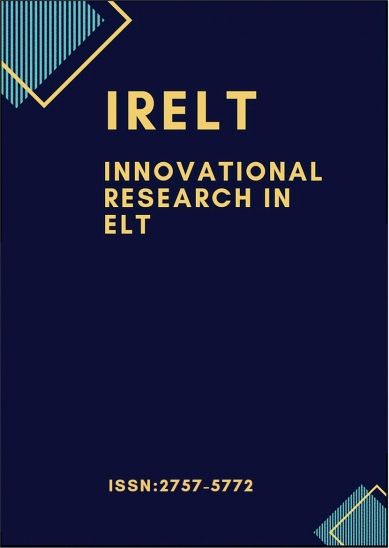Research article | Open Access
Innovational Research in ELT 2024, Vol. 5(2) 26-33
The Role of University EFL Learners' Self-Efficacy in Using Technology Based Out-of-Class Language Learning Activities
pp. 26 - 33 | DOI: https://doi.org/10.29329/irelt.2024.1086.2
Publish Date: December 21, 2024 | Single/Total View: 180/146 | Single/Total Download: 208/159
Abstract
The goal of this study is to ascertain how students see technology based out-of-class language learning activities as well as their views toward self-efficacy. Additionally, it also identified the relationship between EFL learners' self-efficacy and their usage of technology-based out-of-class language learning activities (TBOCLLAs). There were 133 Turkish EFL learners that participated in this quantitative study. They were requested to complete the TBOCLLA and self-efficacy questionnaires. The findings showed that they perceived positively about using technology for language learning activities outside of the classroom. It also revealed that the majority of students are capable of recognizing and maintaining their own sense of self-efficacy. Furthermore, there is a significant relationship between self-efficacy and TBOCLLAs. However, there is no statistically significant difference in the students' use of technology for activities outside of class based on their gender. The results indicate that students' perceptions of their use of technology for language learning outside of the classroom can be greatly influenced by their sense of self-efficacy.
Keywords: technology out-of-class language learning activities (TBOCLLAs), self-efficacy, attitudes, EFL learning.
APA 7th edition
Rahmawati, S., & Kahraman, A. (2024). The Role of University EFL Learners’ Self-Efficacy in Using Technology Based Out-of-Class Language Learning Activities. Innovational Research in ELT, 5(2), 26-33. https://doi.org/10.29329/irelt.2024.1086.2
Harvard
Rahmawati, S. and Kahraman, A. (2024). The Role of University EFL Learners’ Self-Efficacy in Using Technology Based Out-of-Class Language Learning Activities. Innovational Research in ELT, 5(2), pp. 26-33.
Chicago 16th edition
Rahmawati, Suci and Ayhan Kahraman (2024). "The Role of University EFL Learners’ Self-Efficacy in Using Technology Based Out-of-Class Language Learning Activities". Innovational Research in ELT 5 (2):26-33. https://doi.org/10.29329/irelt.2024.1086.2
Abunowara, A., M. (2014). Using technology in EFL/ESL classroom. International Journal of Humanities and Cultural Studies (IJHCS), 1(2). 7-23.
Alotumi, M. (2020). The effect of computer-assisted language learning project (CALLP) on Yemeni EFL student teachers’ perceived TPACK self-efficacy. International Journal of Research in English Education, 5(4). 14-40. http://ijreeonline.com/article-1-439-en.html
Balaman, S. (2020). A study on the impacts of digital storytelling on EFL learners’ self-efficacy and attitudes toward education technologies. International Online Journal of Education and Teaching (IOJET), 7(1), 289-311. http://iojet.org/index.php/IOJET/article/view/471
Dincer, A. (2020). Understanding the characteristics of English language learners' out-of-class language learning through digital practices. IAFOR Journal of Education, 8(2),47-65.
Dong, L., Jamal, M. S., Ibrahim, K. A. A., and Rezai, A. (2022). Fostering EFL learners’ motivation, anxiety, and self-efficacy through computer-assisted language learning- and mobile-assisted language learning-based instructions. Frontiers in Psychology, 13:899557. https://doi:10.3389/fpsyg.2022.899557
Dudeny, G. and Hocky, N. (2008). How to Teach English with Technology. Longman.
Helwa, A., & Abdel-Hamid, H.S. (2019). The effectiveness of multidimensional engagement instructional approach based on communication technology devices in developing student teachers' EFL oral communication skills and self –efficacy. Journal of Education – Sohag University, 68, 1-70.
Honarzad, R., & Rassaei, E. (2017). The role of EFL learners’ autonomy, motivation and self-efficacy in using technology based out-of-class language learning activities. The JALT CALL Journal, 15(3), 23-42.
Lai, C., Zhu, W., & Gong, G. (2015). Understanding the quality of out-of-class English learning. TESOL Quarterly, 49(2), 278-308. https://doi.org/10.1002/tesq.171
Lee, S. (2020) The impact of using machine translation on EFL students’ writing. Computer Assisted Language Learning, 33(3), 157-175, https://doi:10.1080/09588221.2018.1553186
Mackey, A., & Gass, S. M. (2015). Second Language Research: Methodology and Design (2nd ed.). Routledge. https://doi.org/10.4324/9781315750606
Namaziandost, E., & Çakmak, F. (2020). An account of EFL learners’ self-efficacy and gender in the flipped classroom model. Education and Information Technologies, 25, 4041-4055. https://doi.org/10.1007/s10639-020-10167-7
Ngo, H., & Eichelberger, A. (2021). College students' perceived self-efficacy and use of information and communication technologies in EFL learning. International Journal of Education and Development using Information and Communication Technology (IJEDICT), 17(1), 34-44.
Odhabi, H., & Nicks-McCaleb, L. (2011). Video recording lectures: Student and professor perspectives. British Journal of Educational Technology, 42(2), pp. 327-336, https://doi:10.1111/j.1467-8535.2009.01011.x
Schwarzer. R. (Ed.) (1992). Self-efficacy: Thought control of action. Washington, DC Hemisphere.
Schwarzer, R., BaBler, J., Kwiatek, P., and Kerstin Schroder, K. (1997). The assessment of optimistic self-beliefs: Comparison of the German, Spanish, and Chinese versions of the general self-efficacy scale. Applied Psychology: An International Review, 46(1), 69-88.
Somayeh, F & Takeshi, O. (2017). A self-determination theory approach to technology-enhanced out-of-class language learning intention: A case of Japanese EFL learners. International Journal of Research Studies in Language Learning, 6(4), 53-64.
William, M & Burden, R. L. (2004). Psychology for language teachers: A social constructivist approach. Cambridge University Press.
Yukselturk, E,. Altıok, S., & and Başer, Z. (2018). Using game-based learning with kinect technology in foreign language education course. Journal of Educational Technology & Society, 21(3), 159-173.
